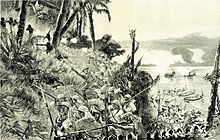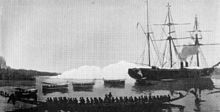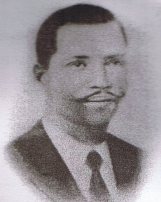Duala (people)
The Duala (their own name Duálá ) are a Cameroonian Bantu people group with around 400,000 members. They speak the Duala language , although the new Cameroonian official languages, English and French, have increasingly been used as mother tongues.
They are mainly located in the Cameroonian Littoral region along the coast and form part of the coastal bantu (Sawa). They have historically played a high and influential role in Cameroon, largely due to their long contact with Europeans , the high level of education and the wealth that has been acquired over the years as traders and landowners.
The Duala are related to several ethnic groups in the Cameroonian littoral, with whom they also share a common traditional origin and similar cultures. These are the Ewondi, the Bodiman, the Pongo, the Bakole , the Bakweri , the Bamboko , the Isubu (Isuwu or Bimbianer), the Limba (or Malimba), the Moungo and the Wovea . The Batanga from the Kribi region are related to the Duala, as they describe their ancestors as descending from Mbedi and their Batanga language can be understood with the Malimba language . In addition , although the Bakundu language is a Lundu-Balong language and not a Duala language, it is closely related to Bakweri , which in turn is a Duala language. Hence the Bakundu can also be considered a Duala people.
The Duala have historically dominated the other groups, and these others all show some kind of kinship with the Duala themselves. In addition, several other coastal peoples such as the Balong , Bakossi and Bankon - who are culturally and historically less related to the Duala - are subordinate the influence of the Duala and also speak Duala to a certain extent. Duala is also spoken by a large part of the Bassa and the Bakoko . The word "Duala" designates either the "actual" Duala, the entire duala-like peoples, or all the "duala" -ized peoples Bassa, Bakoko and Manenguba.
history
Early migratory movements
The early history of the Duala is essentially given by oral tradition. The Duala trace their origins back to a man named Mbedi, who lived in an area called Bakota , in what is now Gabon and the Republic of the Congo . His sons, Ewale and Dibombo , emigrated north and came to a place called Piti on the river called Dibamba . Here the brothers parted ways. Ewale moved to the mouth of the Dibamba with his supporters and then continued northwest to the east bank of the estuary from the Wouri River . Meanwhile, Dibongo and his companions migrated southeast to the Sanaga River and then split up, some drifting upriver with Dibongo and others going downstream with a man named Elimbe. Ewal's people became the Duala, and Dibongo's people became the Limba.
According to the traditional tradition of the Duala, the ethnic groups of the Bakoko and Bassa occupied the Wouri estuary when the Duala arrived. The Duala then drove them inland, an expulsion that occurred in the 17th and early 18th centuries.
Contacts with Europeans
In 1472 the Portuguese reached the Duala coast for the first time . Over the next few decades, adventurers came from all over Europe to discover the estuary and the rivers that branch off it, and to set up trading posts. The Duala offered the newcomers ivory , kola nuts, and paprika as merchandise , but slaves turned out to be more lucrative goods for the Europeans. Most of them ended up as slave labor on the growing plantations on the neighboring islands of Annobón , Fernando Poo , Príncipe and São Tomé . From now on the Duala kept and traded with slaves who lived in separate settlements and performed servant services such as agriculture. Slave owners could only offer their slaves to other Duala and were also responsible for paying the slaves' debts and arranging their marriages. However, with the Europeans supplying such a hungry market, these customs disappeared.
The Duala appeared as the leading traders along the Cameroon coast as early as the 16th century, with the Isubu and Limba developing into real competitors. The earliest Duala traders were mostly chiefs and village heads.
By the middle of the 19th century, the Germans and British had taken the lead in trading with the Duala. This came along with the abolitionist movement, and the British Crown paid the traders to end slavery in the Gulf of Guinea . On June 10, 1840 and May 7, 1841, the Duala Kings and King Bell became the first to sign anti-slavery treaties. In return, the Europeans supplied these rulers annually with textiles, weapons, alcohol and other gifts. In addition, the rulers abolished practices that the British viewed as barbaric, such as sacrificing the chief's wife after his death.
The British also wanted to shape the Duala according to their own ideas about civilization. This meant that the Duala acquired Western education and converted to Christianity.
In response to threats from foreign traders, the British put pressure on the Duala kings to request British annexation. In 1879 King Akwa sent such a request; King Bell followed suit in 1881 (although some historians believe these documents were forged). When King Pass All der Limba ceded his territories to the French , British traders drew attention to the urgency of the Crown's conquest of the Duala territories. In July 1884, however, the German explorer Gustav Nachtigal signed land cessation agreements with the kings Akwa, Bell, and Deido. The British arrived too late, and on March 28, 1885, the territory was ceded by Queen Victoria to the German Empire .
German colonial times

The annexation was followed by opposition from other European colonial powers to the German colonial administration. But Prince Lock Priso also preferred British rule and initiated a rebellion in December 1884. At the same time there was a confrontation between King Bell and his people, who were predominantly against the German colonial administration. Bell then found himself with other Duala chiefs in the so-called Duala War - which was fought due to the killing of a Bonaberi Duala and Bell's alleged refusal to share his profits with the other royal tribes. Germany stopped the violent conflict when a German citizen was killed in the process. Bell survived, but his power waned significantly. As it was realized that the Duala would never again follow the rule of a single king, the Germans played off the competitors against each other. They supported the weakened King Bell to defeat the powerful King Akwa.
Despite the unrest and a small area of land, the Duala territory became the economic and political nexus of the German colony of Cameroon . The Germans ruled originally from Douala from which at that time Cameroon City was called, but moved their capital in 1901 to Bakweri -Siedlung of Buea . Constant shipping along the coast allowed individuals to move from one plantation or town to another in search of work. The coastal peoples, especially the Duala and the Bakweri, mingled like never before.
The German arrival on the mainland meant that the coastal peoples' monopoly on trade ended. Most of the Duala returned to subsistence farming or fishing to survive. Years of contact with "Westerners" and a high level of literacy allowed an educated upper class of traders, clerics and farmers to develop further. This class was familiar with European law and conventions, which made it possible for them to oppose what they saw as the unfair policy of the German colonial government with petitions, legal proceedings and special interest groups . This began in 1910 when the German colonial administration initiated a new poll tax and tried to secure land in the Duala district in order to then relocate the indigenous population from the city. King Bell's successor, King Rudolf Duala Manga Bell attempted to raise resistance by sending envoys to visit the leaders of the peoples inland.
Duala Manga Bell definitely had allies. The Cameroonian kings stuck together. His closest ally, relative, and best friend was King Ekandjoum Joseph, whom he visited when he was persecuted by the Germans. Ekandjoum Joseph resisted and, until his death, refused to cooperate with the German administration, which he deeply mistrusted.
According to the Germans, the sultan of the Bamum kingdom , Ibrahim Njoya from the Bamum people , is said to have given the German colonial administration a hint about this, whereupon King Bell and his collaborators were executed for high treason in 1914.
British-French rule
In 1918 lost Germany in Cameroon the First World War and the German colonies became mandates of the League of Nations . France then became the new administrator of the Duala territories.
From now on, the Duala were subjected to stronger repression and acculturation pressure from the French colonial rulers. Although the French largely disempowered the kings, in the 1930s almost half of the ethnic group members were still important traders, plantation managers or landowners, chiefs or clergy in community service. The rest of the Duala population were fishermen or farmers. In the 1940s many Duala also became famous as constructors and served in the growing cities of Duala and Limbe .
The new colonial rulers changed German politics in such a way that uncooperative rulers were removed and workers were forced to work on plantations. Individuals could choose to pay a fine in order to evade work, resulting in starvation for workers in more affluent areas. The French now preferred inland peoples who were brought to the coast and had to work on the plantations there. The influence of the Duala chiefs was thus to be broken. These immigrants were mainly Bamileke . The newcomers grew numerically and economically dominant over time, creating ethnic tensions with the locals. As early as the early 1930s, the Duala were a minority in the city of Duala, which was named after them.
Culture
The Duala society was traditionally divided into three layers. At the top were the wonja , indigenous Duala with full rights and land ownership. The next level consisted of the Wajili , either non-Duala peoples or the descendants of slaves. After all, the wakomi , or slaves, made up the lowest rank. Chiefs and village chiefs sat at the top of this hierarchy in the past, while these figures now have very little power in their own jurisdiction. Instead, these individuals are more likely to be large property owners and often have inherited wealth. Councils of elders and secret societies allow communities to decide important matters.
Today's duala are divided into urban and rural duala. Those who live in the cities, especially in Duala itself, mostly earn their living through a number of learned and unskilled professions. Many Duala still own parts of the city, which allows them to live off the rents and investments. In contrast, the rural Duala work as fishermen and farmers, mostly on the subsistence level . Fishing is the trade of choice.
Marriage and kinship patterns
The hereditary regulation among the Duala is patrilineal ; after the death of the father, property is divided among the male heirs. The Duala traditionally practiced polygamy , although with the introduction of Christianity this practice became less common. The Duala have never restricted inter-tribal marriages, nor have they forbidden intra-tribal marriages themselves. In fact, marriages outside of the tribes became more common, especially in urban centers such as the city of Duala. Children of these marriages became full members of the father's ethnic group.
Traditional sports
Canoe racing was traditionally the most important sport among the Duala. The sport reached its peak during the German colonial era, when the organizers held races annually on January 27, the birthday of the German Emperor Wilhelm II . Among the French, these were held every six months, on July 14th ( Bastille Day ) and on November 11th ( Jour du Souvenir ). A typical Duala racing canoe is 20–28 meters long and has no keel, but has a bow in which elaborate patterns are notched. A team of 40 to 50 canoeists - mostly men who earn their living as fishermen - stands for every ship. In the past fortune tellers used the results of these races to predict the future, but today Christian priests preside. In the late 1930s, a family on Jebale Island claimed to be able to collect the Miengu Water Spirits to help the preferred contestants win.
Starting in the 1930s, football became so popular that it pushed other Duala sports into the background.
Institutions
Congregations, secret societies, and other groupings play an important role in keeping the Duala united, helping with goal setting, and finding a place of negotiation where solutions can be sought to solve common problems. The most important of these is the Ngondo , an assembly of important chiefs. Another main institution is the muemba (plural: miemba ), an association of all Duala of a certain age or tribal clan. The miemba serve to network and socialize their members. Important secret societies are the Ekongolo, Jengu, Losango, and Munji.
language
The Duala speak a language of the same name . The idiom is closely related to other Duala languages , which represent a common dialect continuum . For example, Malimba speakers have little difficulty in understanding Duala. Duala, in turn, forms part of the Bantu languages within the Niger-Congo language family .
Duala is also used as a commercial language, especially since the language was spread through early missionaries. This is particularly true of the neighboring Wovea , many of whom speak Duala in addition to their language Bubia , as well as the Isubu , many of which are bilingual with Isu and Duala.
In addition, individuals who went to school or grew up in urban areas usually speak French or English , although German has historically been more common. The literacy rate is relatively high among the Duala, although this only applies to writing and reading English or French.
Even in the German colonial times, the Duala men used a kind of " drum language " and drummed encrypted messages to convey messages over long distances.
religion
In the traditional Duala belief, their ancestors live in the sea. In this worldview, half-human water spirits - known as Miengu (singular: Jengu ) - live in the waters and mediate between the worshipers and God. Other, evil spirits live in the forests as well as in the sea, and many Duala therefore believe that witchcraft has an ominous influence on daily life. Traditional festivals held every year serve as the most visible expression of this traditional worldview in modern times.
Most of the Duala were Christianized in the 1930s . Evangelical denominations are dominant here, especially the Baptist Church . Nevertheless, remnants of pre-Christian African ancestor worship persist . This is especially true for the coastal population, the sea still plays an important role in their belief.
Literature sources
- Austen, Ralph A., and Derrick, Jonathan (1999): Middlemen of the Cameroons Rivers: The Duala and their Hinterland, c. 1600 – c.1960 . Cambridge University Press.
- Chrispin, Dr. Pettang, director. Cameroun: Guide touristique. Paris: Les Éditions Wala.
- DeLancey, Mark W., and DeLancey, Mark Dike (2000). Historical Dictionary of the Republic of Cameroon . 3rd ed.
- Derrick, Jonathan (1990). "Colonial élitism in Cameroon: the case of the Duala in the 1930s". Introduction to the History of Cameroon in the Nineteenth and Twentieth Centuries. Palgrave MacMillan.
- Elango, Lovett Z. (1990). "Trade and diplomacy on the Cameroon coast in the nineteenth century, 1833-1879: the case of Bimbia." Introduction to the History of Cameroon in the Nineteenth and Twentieth Centuries. Palgrave MacMillan.
- Fanso, VG (1989). Cameroon History for Secondary Schools and Colleges, Vol. 1: From Prehistoric Times to the Nineteenth Century. Hong Kong: Macmillan Education Ltd.
- Fanso, Verkijika G. (1990). "Trade and Supremacy on the Cameroon Coast, 1879-1887". Introduction to the History of Cameroon in the Nineteenth and Twentieth Centuries. Palgrave MacMillan.
- Ngoh, Victor Julius (1996). History of Cameroon Since 1800. Limbe: Presbook.
Web links
- Gordon, Raymond G., Jr. (ed.) (2005): " Duala ". Ethnologue: Languages of the World , 15th ed.Dallas: SIL International.
- Gordon, Raymond G., Jr. (ed.) (2005): " Isu ". Ethnologue: Languages of the World , 15th ed.Dallas: SIL International.
- Gordon, Raymond G., Jr. (ed.) (2005): " Malimba ". Ethnologue: Languages of the World , 15th ed.Dallas: SIL International.
- Peuple Sawa (in French)
Individual evidence
- ^ Lamberty M., A rapid appraisal survey of Malimba in Cameroon
- ^ Friesen L., Valence change and Oroko verb morphology
- ↑ Fanso, History , pp. 49-50, 52.
- ↑ Fanso, History , pp 50-1.
- ↑ Fanso, History , p. 68.
- ↑ a b Fanso, History , p. 73.
- ↑ Austen and Derrick 66.
- ↑ Austen and Derrick 67.
- ↑ Ngoh 57.
- ↑ Fanso, "Trade", pp. 68-80.
- ↑ Ngoh 102.
- ↑ Ngoh 75.
- ↑ Derrick 107.
- ↑ Austen and Derrick 138.
- ↑ Derrick, 108.
- ↑ Derrick 133.
- ↑ Derrick 123.
- ↑ Ngoh 26:28.
- ↑ Guide touristique 94.
- ↑ a b c Derrick 118.
- ↑ a b Ngoh 28.
- ^ "Malimba", Ethnologue .
- ^ "Duala" and "Isu", Ethnologue .
- ^ "Duala", Ethnologue .
- ↑ Stern, T. Drum and whistle "Languages": an analysis of speech surrogates. American Anthropologist , 59 , 3 , 487-506
- ↑ Guide touristique 126.




